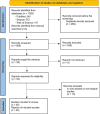Dietary inflammatory index and its association with risk of metabolic syndrome and its components: a systematic review and Meta-analysis of Observational studies
- PMID: 38898498
- PMCID: PMC11188268
- DOI: 10.1186/s41043-024-00580-w
Dietary inflammatory index and its association with risk of metabolic syndrome and its components: a systematic review and Meta-analysis of Observational studies
Abstract
Background: It is believed that the progression and development of metabolic syndrome (MetS) are associated with low-grade systemic inflammation. Several studies have suggested that the Dietary Inflammatory Index (DII), which estimates the inflammatory potential of diets, is associated with MetS. This systematic review and meta-analysis aimed to determine the relationships between DII and the MetS and its components.
Methods: Relevant articles published in English from inception to May 2024 were identified by searching electronic databases including PubMed, Scopus, and Web of Science. We included studies that reported the odds ratio (OR), relative risk (RR), or hazard ratio for the association of DII with the MetS and its components. Effect sizes were pooled using a random effects model.
Results: A total of three prospective studies and 22 cross-sectional studies were included in this meta-analysis. The results showed that pro-inflammatory diets were significantly associated with an increased risk of MetS in cohort studies (RR: 1.33; 95% confidence interval [CI]: 1.19-1.48) and cross-sectional studies (OR:1.24; 95% CI: 1.11-1.38). Meta-analysis of cross-sectional studies showed that a higher DII score was significantly associated with higher odds of hypertension (OR = 1.19; 95% CI = 1.10-1.28) and hyperglycemia (OR = 1.18; CI = 1.06-1.32). The pooled OR comparing the highest versus lowest category of DII with the odds of abdominal obesity and hypertriglyceridemia was significant only after adjustment for covariates.
Conclusions: In general, higher DII is associated with a higher risk of MetS and some of its components. Based on the findings, dietary interventions should be considered for preventing MetS from the inflammatory perspective.
Keywords: Dietary inflammatory index; Inflammation; Meta-analysis; Metabolic syndrome; Obesity.
© 2024. The Author(s).
Conflict of interest statement
The authors declare no competing interests.
The authors declare that they have no competing interests.
Figures



Similar articles
-
Association of dietary inflammatory potential with cardiometabolic risk factors and diseases: a systematic review and dose-response meta-analysis of observational studies.Diabetol Metab Syndr. 2020 Oct 7;12:86. doi: 10.1186/s13098-020-00592-6. eCollection 2020. Diabetol Metab Syndr. 2020. PMID: 33117453 Free PMC article. Review.
-
Metabolic syndrome and its association with the Dietary Inflammatory Index (DII)® in a Croatian working population.J Hum Nutr Diet. 2020 Feb;33(1):128-137. doi: 10.1111/jhn.12695. Epub 2019 Oct 11. J Hum Nutr Diet. 2020. PMID: 31602707
-
Association between Dietary Inflammatory Index, C-Reactive Protein and Metabolic Syndrome: A Cross-Sectional Study.Nutrients. 2018 Jun 27;10(7):831. doi: 10.3390/nu10070831. Nutrients. 2018. PMID: 29954070 Free PMC article.
-
The Possible Mediatory Role of Inflammatory Markers on the Association of Dietary Insulin Index and Insulin Load with Metabolic Syndrome in Women with Overweight and Obesity: A Cross-Sectional Study.Int J Clin Pract. 2023 Aug 21;2023:1979124. doi: 10.1155/2023/1979124. eCollection 2023. Int J Clin Pract. 2023. PMID: 37645243 Free PMC article.
-
The association between dietary inflammatory index and risk of central obesity in adults: An updated systematic review and meta-analysis.Int J Vitam Nutr Res. 2020 Oct;90(5-6):535-552. doi: 10.1024/0300-9831/a000648. Epub 2020 Mar 4. Int J Vitam Nutr Res. 2020. PMID: 32129728
Cited by
-
Efficacy of a Neuroimmune Therapy Including Pineal Methoxyindoles, Angiotensin 1-7, and Endocannabinoids in Cancer, Autoimmune, and Neurodegenerative Diseases.Clin Interv Aging. 2025 Apr 29;20:513-522. doi: 10.2147/CIA.S513910. eCollection 2025. Clin Interv Aging. 2025. PMID: 40330271 Free PMC article.
-
Association between dietary inflammatory index and cardiovascular-kidney-metabolic syndrome risk: a cross-sectional study.Nutr J. 2025 Apr 12;24(1):60. doi: 10.1186/s12937-025-01127-3. Nutr J. 2025. PMID: 40221720 Free PMC article.
-
Dietary inflammatory index and the risk of esophageal cancer: a systematic review and meta-analysis.BMC Cancer. 2025 May 3;25(1):826. doi: 10.1186/s12885-025-14199-5. BMC Cancer. 2025. PMID: 40319274 Free PMC article.
-
Association between dietary inflammatory index score and cardiovascular-kidney-metabolic syndrome: a cross-sectional study based on NHANES.Front Nutr. 2025 May 9;12:1557491. doi: 10.3389/fnut.2025.1557491. eCollection 2025. Front Nutr. 2025. PMID: 40416382 Free PMC article.
-
An empirical dietary inflammatory pattern increases the incidence of the metabolic syndrome in a multi-ethnic Asian population.Eur J Nutr. 2025 Aug 14;64(6):256. doi: 10.1007/s00394-025-03770-2. Eur J Nutr. 2025. PMID: 40810800 Free PMC article.
References
-
- Alberti KG, Eckel RH, Grundy SM, Zimmet PZ, Cleeman JI, Donato KA, et al. Harmonizing the metabolic syndrome: a joint interim statement of the international diabetes federation task force on epidemiology and prevention; national heart, lung, and blood institute; American heart association; world heart federation; international atherosclerosis society; and international association for the study of obesity. Circulation. 2009;120(16):1640–5. doi: 10.1161/CIRCULATIONAHA.109.192644. - DOI - PubMed
-
- Noubiap JJ, Nansseu JR, Lontchi-Yimagou E, Nkeck JR, Nyaga UF, Ngouo AT, et al. Geographic distribution of metabolic syndrome and its components in the general adult population: a meta-analysis of global data from 28 million individuals. Diabetes Res Clin Pract. 2022;188:109924. doi: 10.1016/j.diabres.2022.109924. - DOI - PubMed
Publication types
MeSH terms
LinkOut - more resources
Full Text Sources
Medical

